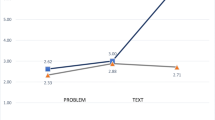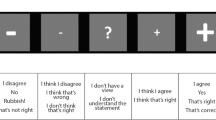Abstract
A test of cognitive bibliotherapy knowledge wasdeveloped and evaluated. Fifty-seven items that relatedto the content of the book, Feeling Good (Burns, 1980),were administered to a total of 99 participants in two depression bibliotherapy studies and toa group of 22 community participants who had notreceived the treatment. Analyses of reliability andvalidity, including an item-response analysis, suggested a 23-item version of the test was optimal.Using the same data, we then tested the hypothesis thatpersons who had read the book would achieve higherscores than those who had not read the book. The test scores reliably distinguished betweenparticipants who had received the treatment and thosewho had not. Cross-validation was undertaken with 21older adult participants in an independent depressiontreatment study, with those who had read the bookachieving higher scores than those who had not.Potential clinical and research uses of the test areproposed.
Similar content being viewed by others

REFERENCES
Ackerson, J., Scogin, F., McKendree-Smith, N., & Lyman, R.D., (1998). Cognitive bibliotherapy for mild and moderate adolescent depressive symptomatology. Journal of Consulting and Clinical Psychology, 66,685–690.
Beck, A. T., Rush, J. A., Shaw, B. F., & Emery, G. (1979). Cognitive therapy of depression. New York: Guilford Press.
Burns, D. D. (1980). Feeling good. New York: Guilford Press.
Burns, D. D., & Nolen-Hoeksema, S. (1992). Therapeutic empathy and recovery from depression in cognitive-behavioral therapy: A structural equation mode l. Journal of Consulting and Clincial Psychology, 60, 441–449.
Dobson, K. (1989). A meta-analysis of the efficacy of cognitive therapy for depression. Journal of Consulting and Clinical Psychology, 57, 414–419.
Elkin, I., Shea, T., Watkins, J. T., Imber, S. D., Sotsky, S. M., Collins, J. F., Glass, D. R., Pilkonis, P. A., Leber, W. R., Docherty, J. P., Fiester, S. J., & Parloff, M. B. (1989). National Institute of Mental Health Treatment of Depression Collaborative Research Program: General effectiveness of treatments. Archives of General Psychiatry, 46, 971–982.
Flesch, R. (1951). How to test readability. New York: Harper.
Glasgow, R. E., & Rosen, G. M. (1978). Behavioral bibliotherapy: A review of self-help behavior therapy manuals. Psychological Bulletin, 85, 1–23.
Hamilton, M. (1960). A rating scale for depression. Journal of Neurology, Neurosurgery and Psychiatry, 23, 56–62.
Ilardi, S., & Craighead, W. (1994). The role of nonspecific factors in cognitive-behavioral therapy for depression. Clinical Psychology: Science and Practice, 1, 138–156.
Jamison, C., & Scogin, F. (1995). The outcome of cognitive bibliotherapy with depressed adults. Journal of Consulting and Clinical Psychology, 63, 644–650.
Lichstein, K. L. (1994). Fair tests of clincial trials: A treatment implementation model. Advances in Behaviour Research and Therapy, 16, 1–29.
Scogin, F., Hamblin, D., & Beutler, L. E. (1987). Bibliotherapy for depressed older adults: A self-help alternative. The Gerontologist, 27, 383–387.
Scogin, F., Jamison, C., & Gochneaur, K. (1989). Comparative efficacy of cognitive and behavioral bibliotherapy for mildly and moderately depressed older adults. Journal of Consulting and Clinical Psychology, 57, 403–407.
Whisman, M. (1993). Mediators and moderators of change in cognitive therapy of depression. Psychological Bulletin, 114, 248–265.
Yesavage, J. A., Brink, T. L., Rose, T. S., Lum, O., Huang, U., Adey, M., & Leirer, V. O. (1983). Development and validation of a geriatric screening scale: A preliminary report. Journal of Psychiatric Research, 17, 37–49.
Rights and permissions
About this article
Cite this article
Scogin, F., Jamison, C., Floyd, M. et al. Measuring Learning in Depression Treatment: A Cognitive Bibliotherapy Test. Cognitive Therapy and Research 22, 475–482 (1998). https://doi.org/10.1023/A:1018773632550
Issue Date:
DOI: https://doi.org/10.1023/A:1018773632550



